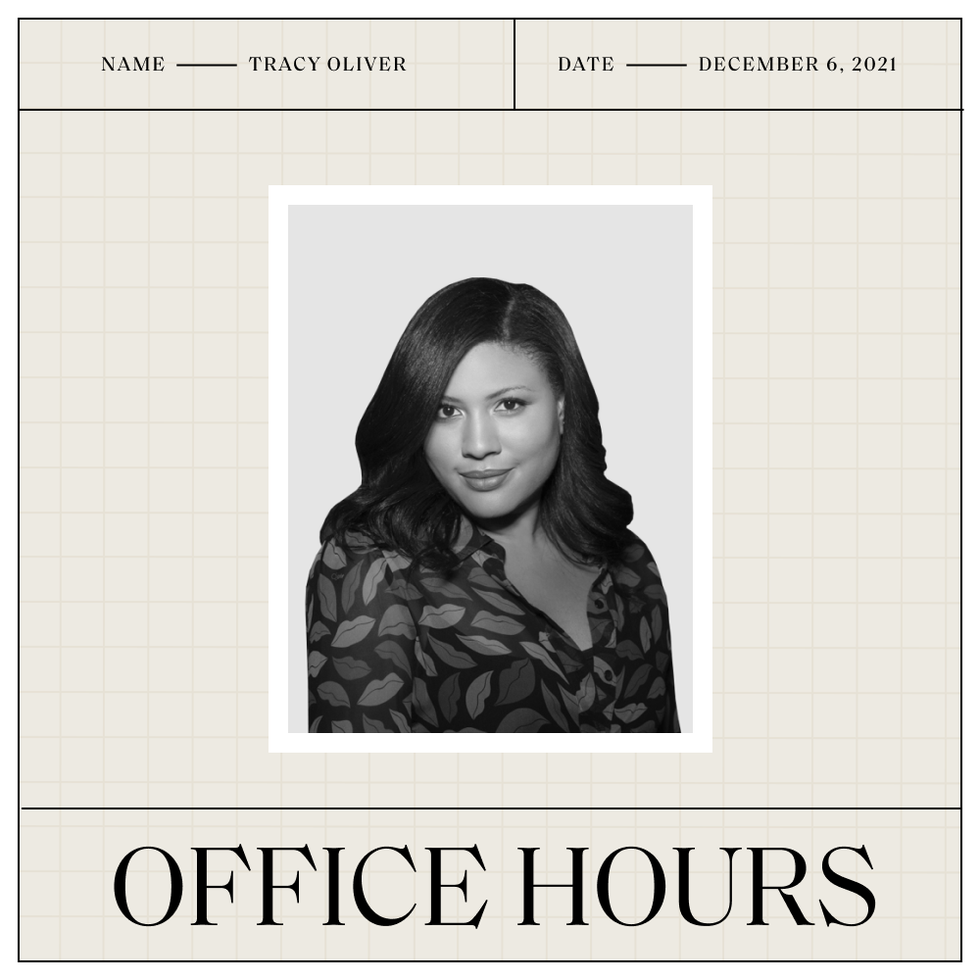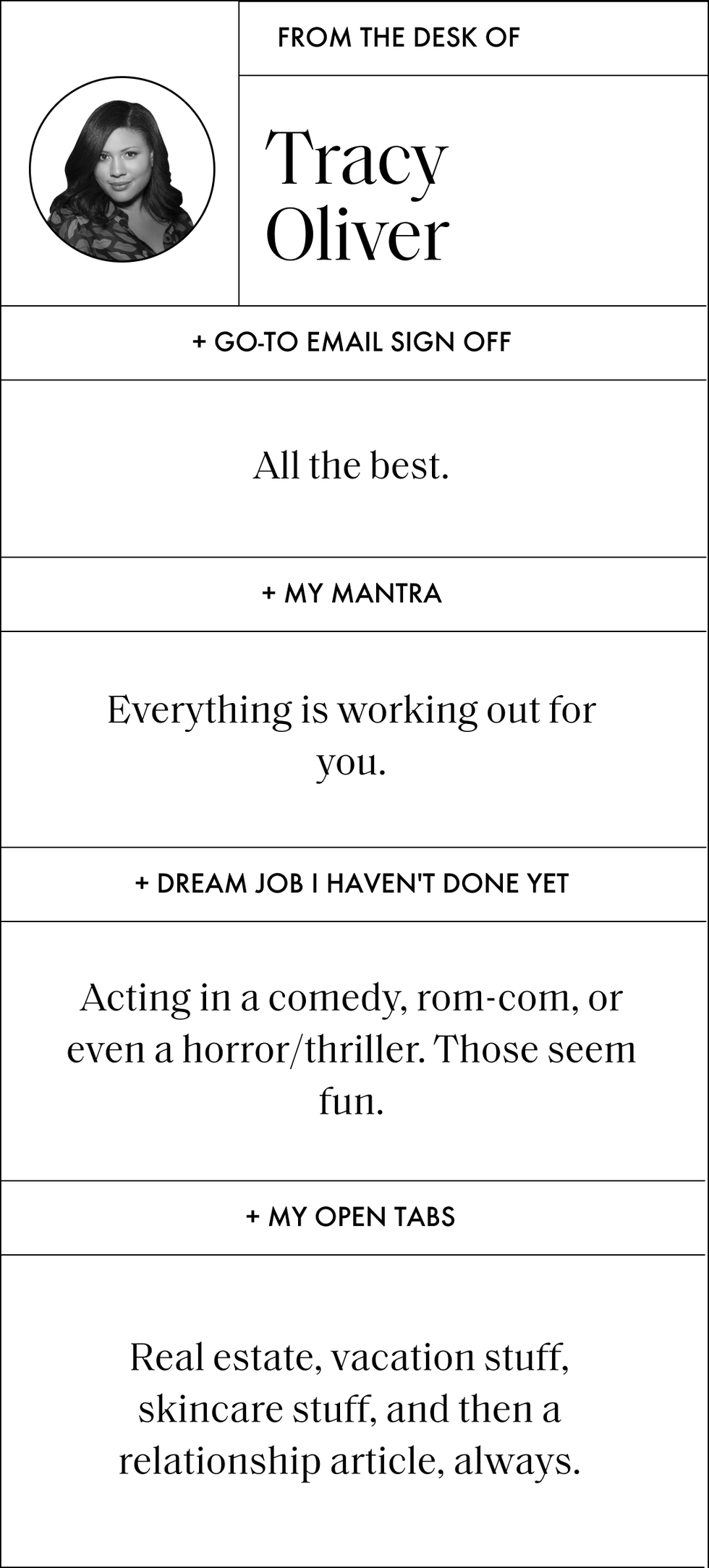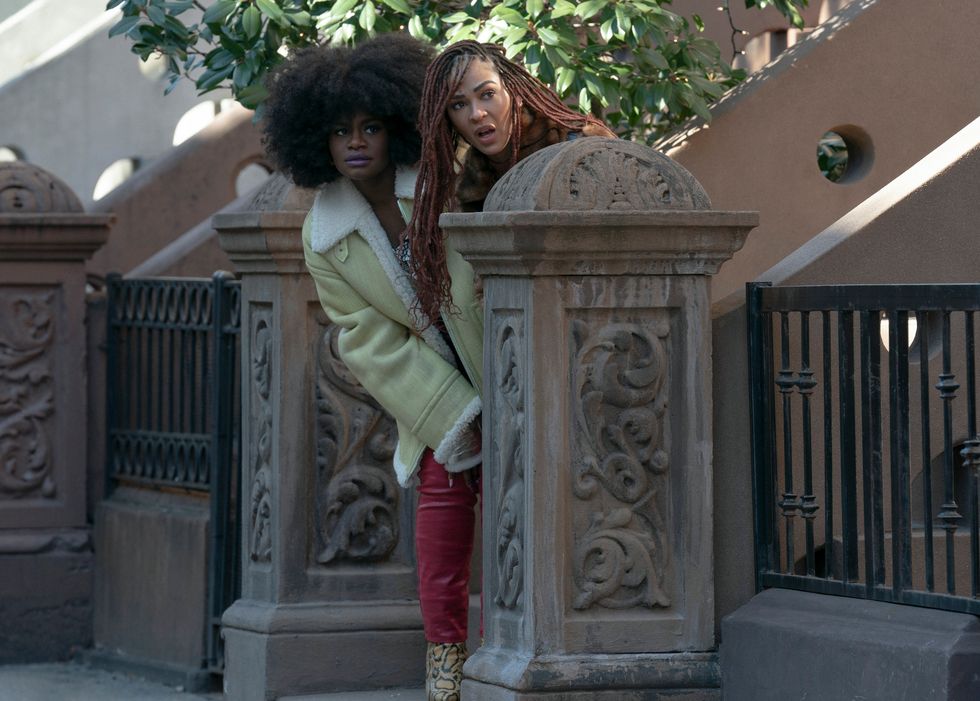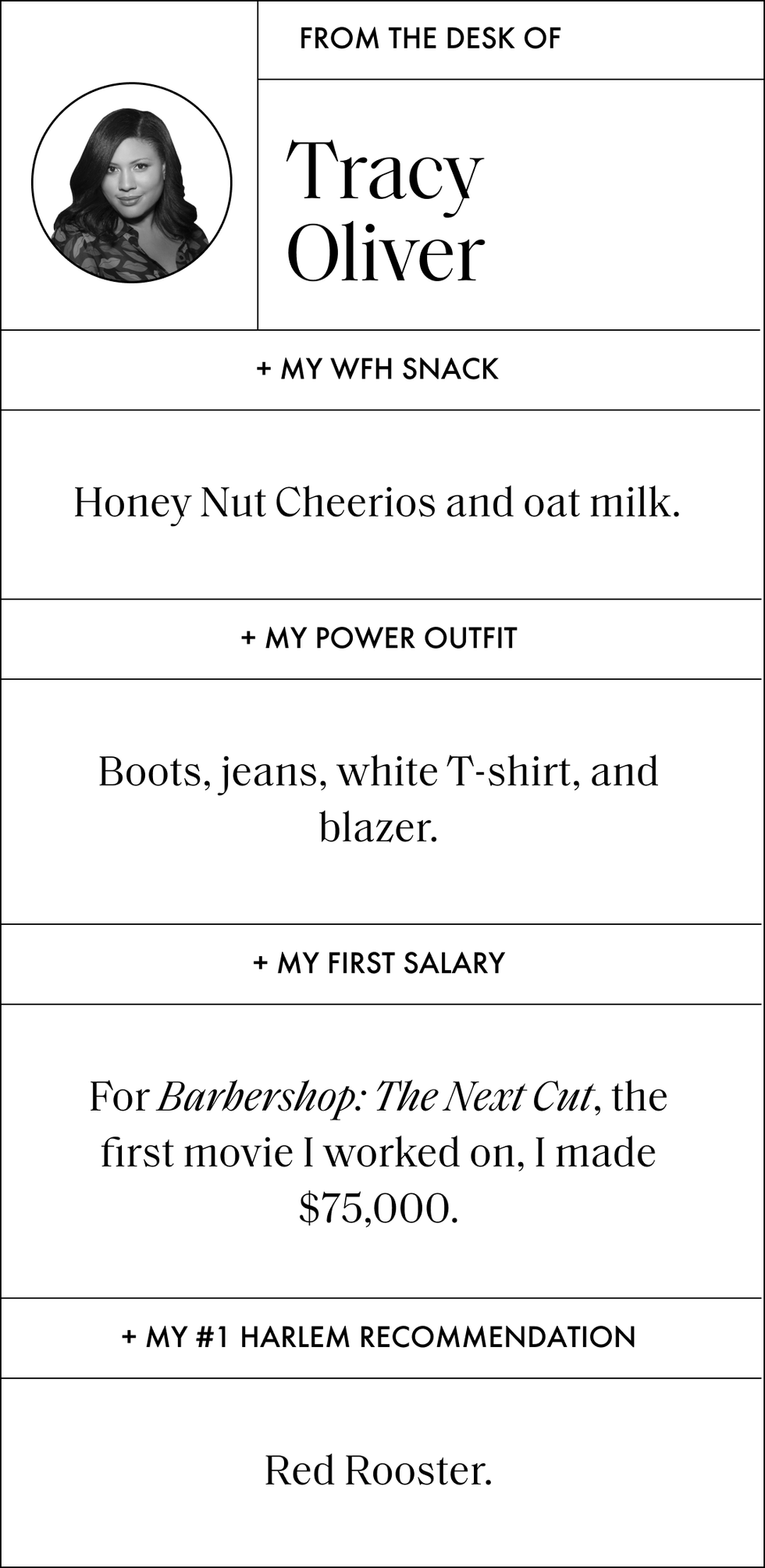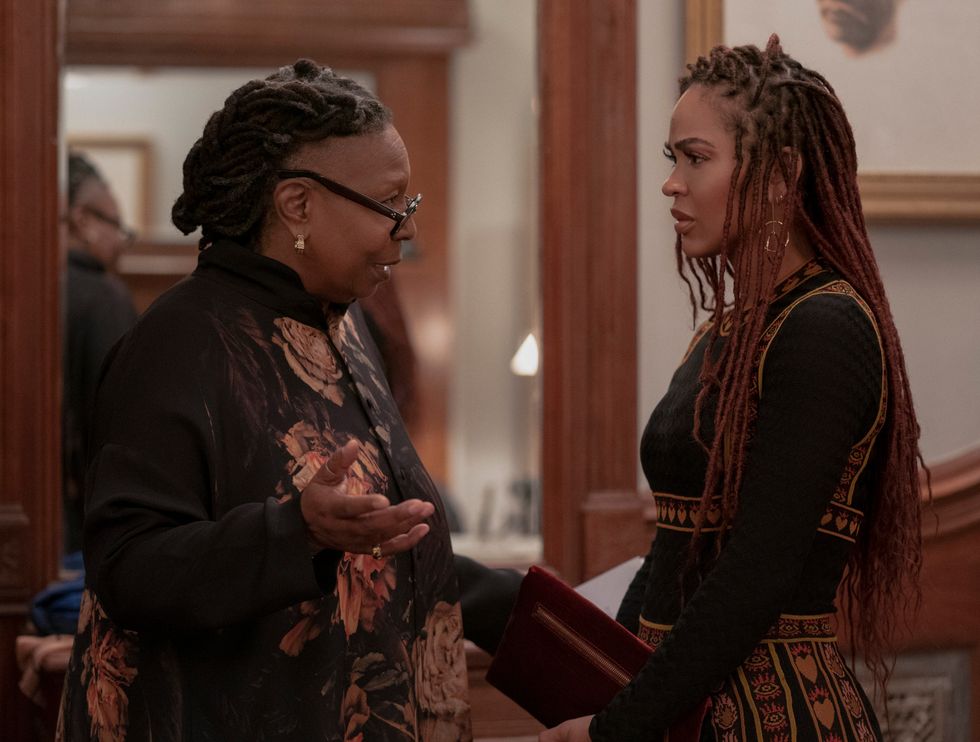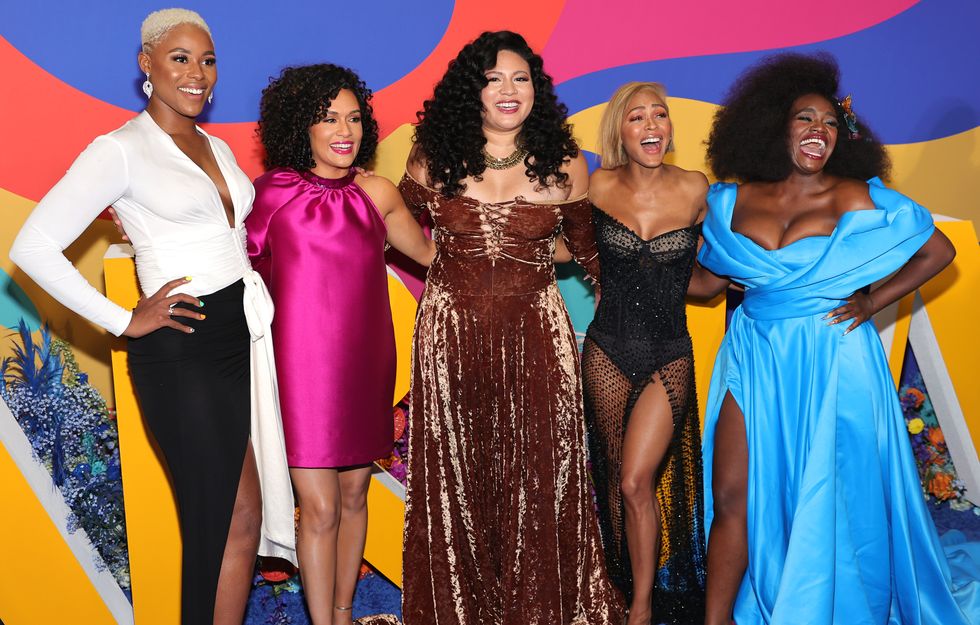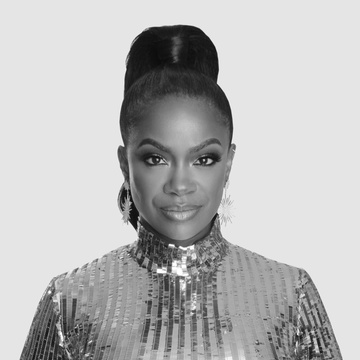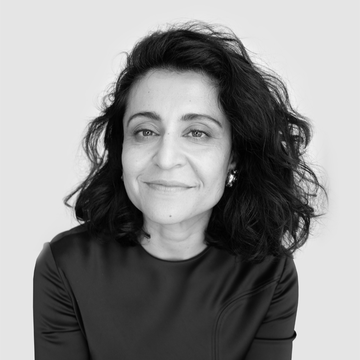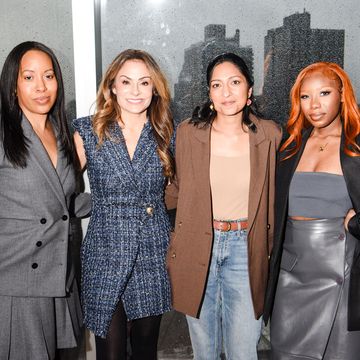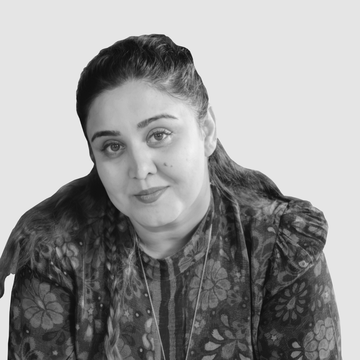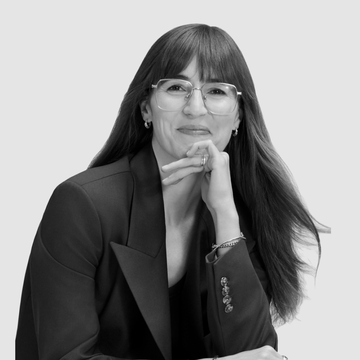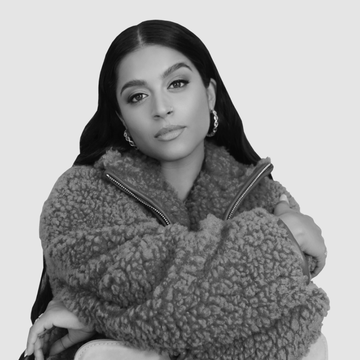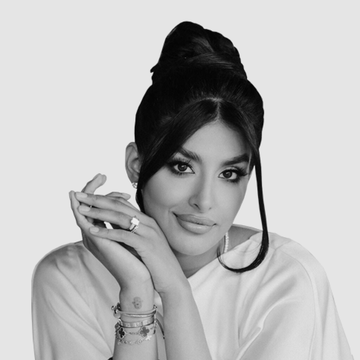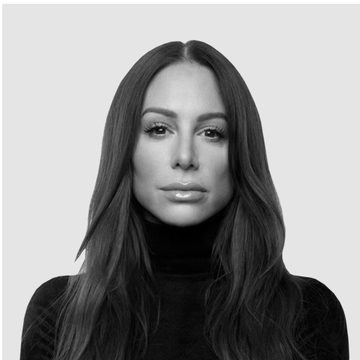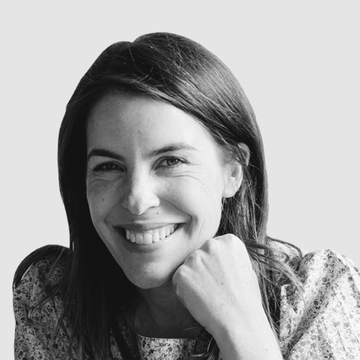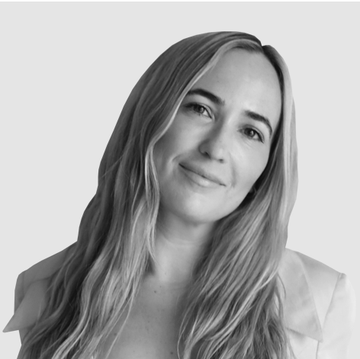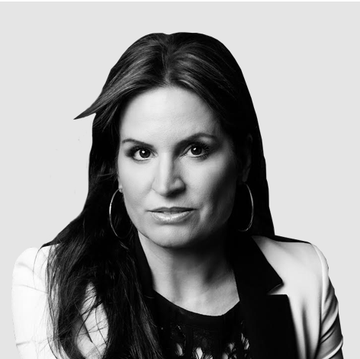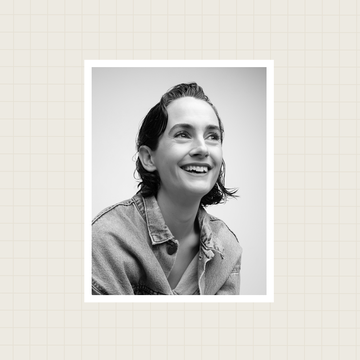In ELLE.com’s monthly series Office Hours, we ask people in powerful positions to take us through their first jobs, worst jobs, and everything in between. This month, we spoke with Tracy Oliver, the writer and producer behind some of the funniest Black female-led projects of the last decade. Oliver got her start acting in Issa Rae’s web series The Misadventures of Awkward Black Girl, and in 2017, she became the first Black woman to write a film that grossed more than $100 million with her smash-hit Girls Trip. Since then, she’s gone onto to write Little, The Sun Is Also a Star, and the BET series First Wives Club, landing an eight-figure deal with Apple along the way. Now, she’s released her “most personal piece,” the Amazon series Harlem, about four 30-something Black women finding their way in the eponymous neighborhood. Below, Oliver shares the mind-blowing moment she had on set and how she learned to ignore people who told her to “stop writing Black characters.”
My first job
I was a waitress/hostess at this chain restaurant called O’Charley’s in Columbia, South Carolina. I actually think having a restaurant job might be the perfect first job, because you learn so much about working under pressure. Everything’s fast-paced. The thing I’ve kept with me from that job is to be nice to people. I know that sounds really basic, but people would come to dinner just to be awful. It makes everything better if everybody has a good attitude, so don’t bring that to work and don’t bring it when you go out.
My worst job
I worked at The Gap, and no disrespect to The Gap, but retail was not good for me. The reason behind it is so stupid, but I hate folding clothes with a passion. I don’t even like folding my own clothes. I will do this thing of leaving them in the dryer and then just pulling them out and putting them on. So the idea of folding hundreds of shirts, I hated it. I hated having to fold pants, and you have to do it in this perfect way, and they would tell me my folds were really sloppy. I would never want to do that again.
The first time I felt like I’m where I’m supposed to be
Sitting at the ArcLight the Friday night when Girls Trip came out. I had seen so many movies at the ArcLight, and then to have your name on the big screen and have everybody collectively enjoy it was really gratifying. There were maybe 17 drafts and so much fear involved in that movie. So that was a moment where I thought, okay, it was worth it. I’m onto something with this.
Why creating Harlem was my most personal project
I wrote Harlem years ago, before Girls Trip came out. I was trying to make sense of my life and my friends and what we were going through at that moment. I had this idea that I was going to have a fairy-tale ending, and it was going to happen on the brink of 30. Then as I was rapidly approaching 30, I was like, “Oh my god, nothing is working out the way I thought.” A lot of the shows at that time were about the uncertainty of your 20s. But what happens when you’re in your 30s, and you’re still a mess, and you and your friends are nowhere near getting married, and you just got fired from your job? And you thought you were going to have kids and maybe can’t? I was also frustrated, because I loved my time in New York, and it was so influential for me, but I didn’t see any New York-set shows that had people that looked like me in them. I thought, how are we getting gentrified out of everything? New York has such a robust, culturally rich Black and brown world that I was like, well, maybe you should write that. Then I sent it to my team, and they said, “This is your most personal piece. It feels the most like you, except I don’t know where we can sell it right now.” It was too early in the marketplace for that. Then, I would say, because of Girls Trip, it set in motion a way for me to bring Harlem back.
How I’ve navigated painful moments
[Being told Harlem couldn’t sell was] one of a few times I’ve been told things that are deeply hurtful to your core. When I was coming out of film school, I was told, “You’re such a good writer. You should stop writing Black characters, and just start writing white characters, so you can work. You’re good enough. You don’t have to keep writing these things.” I was like, “These things? These things that are about my life and my family and Black and brown people?” I don’t think people realize how crazy that is to take in that information. I think people don’t realize that, in saying that, you’re actually implying that some stories are more valuable than others. That was my takeaway at the time: I’m not as valuable. You’re saying my life, or the people that I write about, are of lesser value. And that’s hurtful to process. Luckily, I’m a fighter and an activist/writer, so I never really gave up.
What it was like to meet my idol
I’m a huge Whoopi Goldberg fan. I grew up on Sister Act and The Color Purple and Ghost. I always thought she was a rock star. I put her on my dream cast list for Harlem, and I was like, “Let’s just go to her and get the quick pass, so I can feel like we tried.” And then she did decided to do it, and I was so nervous on set to talk to her because—I said this to her—Whoopi is scary to me. She has this larger-than-life presence and a very intimidating face and energy. So I go up to her, and she goes, “Hi Tracy,” and I was like, “You know my name?” She was like, “Of course. I’ve been dying to work with you.” I cried and told her that she’s my idol and this was the moment I’ve been dreaming about. Her being familiar with me and what I do and agreeing to work with me, I was just humbled and overwhelmed by it.
How I learned to value my own work
Going into Girls Trip, I didn’t really know my own value as a writer. To me, so much of a project starts on the page. If you’re not doing all of that incredible, grueling work, you have nothing. And in the beginning of my career, I didn’t know to put a lot of value on that. You’re just constantly doing free rewrites, midnight passes, and working around the clock, thinking, this is the best that it can be, because I’m the lowest on the totem pole. Now I’m like, what I do is f’ing great and valuable, and you would have nothing without all the work I put in. I sound like I’m in a romantic relationship as I’m talking about this, but if you want my commitment and my love, you have to pay for it, and you have to value it. That’s where I am now.
My tools for fighting burnout
I felt like I was kind of floating in COVID. I’d have a 9 A.M. Zoom, so this body would just prop itself up on a chair, and you’re sitting there, but you’re not really engaged and present. Once I was getting to that place, I was like, all right, I’m going to journal every day, I’m going to meditate. Taking time to silence the mind and figure out what you’re dealing with so you’re processing your emotions and staying present, that was helping me find peace and motivation. I’ve never been more spiritual in my life than in 2020.
How I’ve seen Hollywood progress
When I first wrote Harlem, there wasn’t even anything like Girls Trip to point to. Now, there are two shows set in Harlem, and if that’s not the embodiment of how far we’ve come, I don’t know what is. It used to be you could only have one show of its kind out at the same time. So when Black-ish was at its peak, people were like, “We have the one Black family show.” The fact that I’m seeing two shows set in Harlem and other shows like Insecure and Atlanta, I think that’s progress, because it’s allowing us to coexist and not compete. I try to resist when people say, “You can’t do that because so-and-so is also doing this.” My version is different, because I’m different. I love both Girls and Broad City. I never thought they were the same show, but if you actually distilled it down to a logline—white women trying to find themselves in their 20s in New York City—you would reduce them to the same thing. But the tone and the voice was night and day. So what I ask people is to allow me the creative freedom and the space to just be myself and not compare me to someone else, because I know that we’re different.
This interview has been edited and condensed for clarity.
